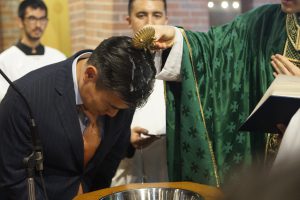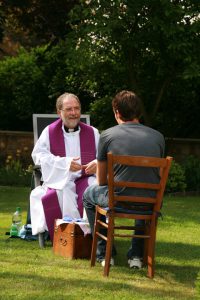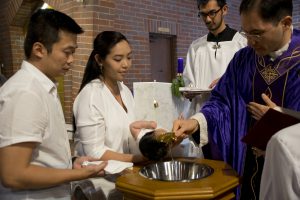 Dear brothers and sisters, and dear guests, if we were to die and meet God, and He were to ask us, “Why should I let you into heaven?” what would we answer? The answer affects where we’ll spend eternity.
Dear brothers and sisters, and dear guests, if we were to die and meet God, and He were to ask us, “Why should I let you into heaven?” what would we answer? The answer affects where we’ll spend eternity.
Most of us would answer: “Well, I didn’t kill anyone.” Now, there’s a high standard! “I’m a good person, tried to be honest (most of the time), loved my family, prayed almost every day, went to Mass. I was active in my parish. I taught Faith Studies, went to Alpha; I was part of the CWL/Knights of Columbus.”
These answers are all wrong for two reasons: First, being a good person is good, but not great; it doesn’t require remarkable effort. What would be great is if we were to say something such as, “I sacrificed my life for other people. I tried to be holy, as Jesus.” But even that’s not enough because of the second reason, which is, it goes against the Bible, which over and over again says that Jesus saves us, we do not save ourselves. The Second Reading, from the letter of St. Paul to St. Titus, talks to us about salvation. It says, “When the goodness and loving kindness of God our Saviour appeared, he saved us, not because of any works of righteousness that we had done, but according to his mercy, through the water of rebirth and renewal by the Holy Spirit. This Spirit he poured out on us richly through Jesus Christ our Saviour, so that, having been justified by his grace, we might become heirs according to the hope of eternal life” (Tit 3:4-7).
Let’s break this down:
1) For the past year, we’ve emphasized repeatedly how Jesus is God and is our Saviour. (Please see: You Can’t Solve It, You Need a Saviour; The Kerygma Makes Life Better; Helping Those Who Seek God; What a Priest Does All Day.) He saves us because of His love for us.
2) We cannot save ourselves; we don’t deserve to be saved; and we can’t earn it.
 3) What’s “the water of rebirth and renewal by the Holy Spirit”? It’s Baptism. The Bible states many times how we are saved by water, meaning baptism, which is necessary for salvation (Cf. CCC 1257-1261).
3) What’s “the water of rebirth and renewal by the Holy Spirit”? It’s Baptism. The Bible states many times how we are saved by water, meaning baptism, which is necessary for salvation (Cf. CCC 1257-1261).
4) To be ‘justified’ is an important idea in the New Testament. It means that we’re “cleansed from sin and made righteous in the sight of God… In the legal context, a judge justifies the innocent when he acquits them of unproven charges” (Ignatius Catholic Study Bible, 260). When we’re justified, we’re in a covenant with God, like the relationship of marriage.
I once heard a Catholic teacher say how he loved what he received in Catholic schools, so much so that he became a Catholic school teacher himself. He learned to help the poor, be a good person, and love his family. But he never even mentioned Jesus! Twelve years of Catholic education and he missed the part that Jesus loves us and wants us to love Him in return! The first commandment is to love God! And as we learned two weeks ago, one of the commandments is to believe in Jesus’ name. Perhaps he was never taught it, which is even scarier.
Now, why can’t we save ourselves? Because, when we really understand sin, there’s nothing we can do to compensate for it; we have to wait for the other person to forgive us. When I punched my dad, there’s absolutely no way I could compensate for the wrong I did. I’d try to do penance, but I’d still need my dad to forgive me.
When we let down our guard and ponder in our hearts, many of us remember that we have done some very sinful things in our lives: perhaps we’ve been involved in abortion, have committed adultery or, as Jesus says, we’ve committed adultery in our hearts, we’ve taken advantage of people, we’ve gravely hurt our parents or children by our ongoing selfishness. Is there anyone here who hasn’t committed a mortal sin, meaning we did something gravely wrong when we knew it was wrong and chose it anyway?
 In 1986, there was a movie called The Mission, on the Vatican’s film list of movies with religious significance. Robert De Niro plays Mendoza, a slave trader who kills his brother. Because of this, he falls into despair, isolating himself in a monastery, not eating, and wanting to die. A priest comes to visit him and says, “So… you killed your brother. Is this remorse?” Mendoza says, “Leave… priest… You know what I am.” “Yes, you’re a mercenary, a slave trader, and you killed your brother. I know. And you loved him.” That’s a key line! The reason why all of us feel guilt is because there’s goodness planted in us by God, and we do love Him and the people we’ve hurt.
In 1986, there was a movie called The Mission, on the Vatican’s film list of movies with religious significance. Robert De Niro plays Mendoza, a slave trader who kills his brother. Because of this, he falls into despair, isolating himself in a monastery, not eating, and wanting to die. A priest comes to visit him and says, “So… you killed your brother. Is this remorse?” Mendoza says, “Leave… priest… You know what I am.” “Yes, you’re a mercenary, a slave trader, and you killed your brother. I know. And you loved him.” That’s a key line! The reason why all of us feel guilt is because there’s goodness planted in us by God, and we do love Him and the people we’ve hurt.
But Mendoza says, “There is nothing else.” And the priest insists, “There is life!” “There is no life!” “There is a way out.” “For me, there is no redemption.” “God gave us the burden of freedom. You chose your crime. Do you have the courage to choose your penance?”
And so Mendoza chooses to carry around a net of armour and weapons, weighing probably over 100 pounds. He takes it up hills, up cliffs, and falls down over and over again, trying to make up for killing the brother he loved. But he can’t. Clearly, the burden symbolizes our sins, the weight of which we carry with us all the time (In the film, Mendoza even sleeps with the rope around his chest).
He accompanies the group of priests deeper into the jungle, towards the home of the indigenous people. These people trust the priests, who have been trying to protect them, but, when they see Mendoza, they immediately recognize him as the slave trader who would capture their people, torture and kill them. When one of the people sees him, he runs to him, holds a knife to his throat, but instead of killing him, he cuts off the burden in an act of mercy. Mendoza, overwhelmed by his sinfulness but also the mercy, starts crying. Someone’s taken away his guilt! He didn’t deserve it, but someone freed him!
That’s what Jesus does for us! That freedom is offered to all of us! He’s our redeemer who cuts away our sin and forgives us. Every sin can be forgiven.
Now let’s say we haven’t done anything that bad. Archbishop Sheen still says that the gravity of sin also depends on whom we hurt. So, for example, slapping our friend in the face is bad. But slapping your grandmother is worse. Lying is always wrong, but lying to our parents is worse, because we’re betraying the covenant between us and them. If we truly appreciated how much our parents have loved us, done for us, sacrificed for us, and then we realize the way we’ve treated them, we would recognize that our little sins against them are truly terrible.
When God asks, “Why should I let you into heaven?” and we don’t even mention Jesus in the answer, we’re missing out on the fundamental point of Christianity, that God wants a relationship with us. Yes, He wants good actions, but first He wants us to love Him. That’s why we’re focusing this season on the Eucharist. God wants to spend time with us. Wouldn’t it be beautiful if, when we died, God asked this question, and we said, “Because I want to be with You. We spent so much time together in the chapel that I want to be with You forever.” That’s love!
 Okay, so Jesus saves us, but we still have to do something to accept Him. If ever people or our children ever ask us how to go to heaven, here’s the clear answer: To be saved, “You need to repent, have faith, and be baptized. If you commit a mortal sin, you need to repent, have faith, and go to Confession.” Repent means to change our lives and actions; faith means to trust in God, believe what He teaches and obey Him, which leads to loving Him; and Baptism and Confession are the ways God gives us new life.
Okay, so Jesus saves us, but we still have to do something to accept Him. If ever people or our children ever ask us how to go to heaven, here’s the clear answer: To be saved, “You need to repent, have faith, and be baptized. If you commit a mortal sin, you need to repent, have faith, and go to Confession.” Repent means to change our lives and actions; faith means to trust in God, believe what He teaches and obey Him, which leads to loving Him; and Baptism and Confession are the ways God gives us new life.
All of us were born with original sin, meaning we inherited from Adam and Eve a separation from God, meaning we’re born without spiritual life. And when we’re spiritually dead, we need someone to resuscitate us. That’s what God does through Baptism. He brings us back to life and gives us a spiritual blood transfusion, giving us His life. The same occurs through Confession.
 By the way, Baptism is so important that the Church says that we should have our babies baptized, when? Within one month of their birth. The repentance and faith are shown by the parents, of which one of the signs is going to Mass every week.
By the way, Baptism is so important that the Church says that we should have our babies baptized, when? Within one month of their birth. The repentance and faith are shown by the parents, of which one of the signs is going to Mass every week.
Part of “proclaiming Jesus in every circumstance” (from our parish vision) means being able to articulate what we believe when people ask. If people want to know what the Bible teaches about salvation, and when our children ask this question, we now have a clear answer.
Why should God let us into heaven? Because Jesus saved us. And what did we do to receive Him? We repented, had faith and we’re baptized/went to Confession.
*******************************
After Mass, a wonderful family from our parish, gave an inspiring pulpit testimony on why they chose to send their children to a Catholic school.
Good morning, brothers and sisters in Christ.
My name is Hardy and this is my wife Ratna and our three children: Alex, Shawn, and Caitlin. Alex and Shawn are St. Anthony’s Alumni while Caitlin still has a year and a half to go.
Today we are here to talk about Catholic education and why we’ve put our children in a Catholic school.
We have been parishioners and school parents for about 11 years. When we first were considering a school for Alex, I was thinking of a public school because it was cheaper. My thought was that school was only for education, and faith could be learned from us as parents, and the church. However, Ratna was really adamant about Catholic schools and because I am a smart husband, I listened to my wife and we put him in St. Anthony’s school. Looking back I am really glad we did and I also think it was part of God’s plan. Why? Just look at what the world is becoming. Who would have guessed all the things we have to worry about and deal with now? Things like social media, euthanasia, abortion, LGBT and transgender issues.
Ratna: Education is important for our children but we think it is more important to teach our children to have a strong Catholic faith and Catholic values, to really know what is right and always follow Jesus’ teachings. The best way to do this is to have them immersed in an environment that provides them with Catholic values, which is what our school provides.
Alex: During my time at our school, I increasingly developed my understanding of our Catholic faith. From the school I developed my courage, wisdom, and love for God. Currently I am a grade 12 student attending Vancouver College. I’ve helped lead many retreats and take on the responsibility as Vice President of the Pro-Life club. Later this spring break I will go to Peru with the Faith in Action team to be with the marginalized, and build homes for those who are less fortunate than we are. The experience I gained from St. Anthony’s has given me the courage to take on these responsibilities and follow the path to become a saint.
Shawn: I’ve been altar serving for 7 years now. But it started when I was in grade 4 at our school. We have a school Mass once a month and that’s how I started. I keep doing it because I want to help the church in some way, and since my brother had already chosen to join the choir, I chose serving. I found a sense of peace when I serve God at the altar and I’ve also learned a lot about God and the Church. I thank the school for giving me this experience.
Caitlin: I really enjoy the school because the teachers and staff are very supportive and I have a lot of good friends. One of my favorite subjects is Religion with Sr. Janet. I learn a lot of stories from the Bible and I present them in fun ways, such as making a poster board, a movie, or doing a play. I also learn about the lives of Saints. I’ve learned that Saints were regular people like you and I. This makes me believe that it is possible to become a saint.
And now we would like to invite our school principal, Mr. Michael Perry, to talk about St. Anthony of Padua Elementary School’s “Open House” on Wednesday, January 16 from 12:30 pm to 3:00 pm.
Thank you and God bless.
